Bernie Sanders Hitting A Rough Patch
Bernie Sanders is finding that the 2020 campaign is very different from 2016.
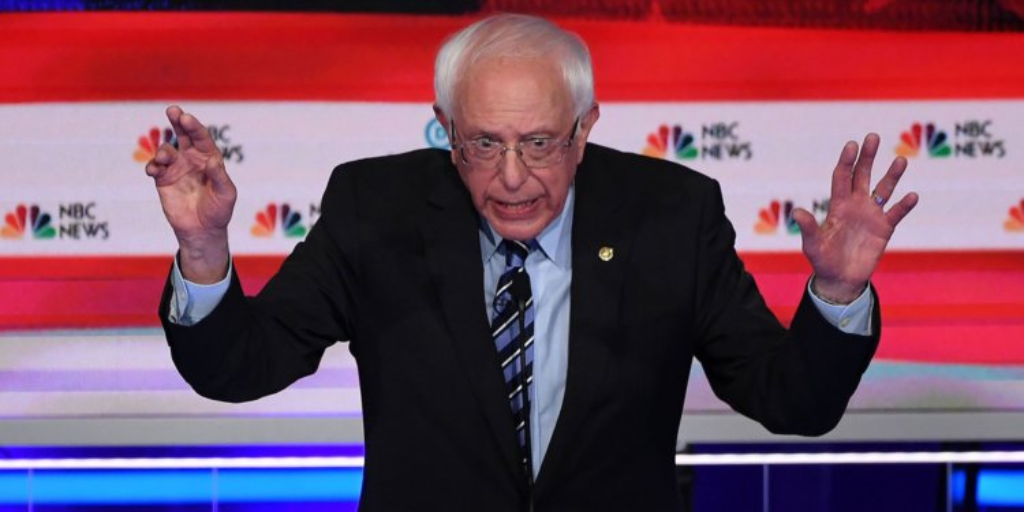
While much of the focus in the analysis of the polling that has taken place since the debates at the end of June has been focused on Senator Kamala Harris and former Vice-President Joe Biden, it’s actually Vermont Senator Bernie Sanders who is getting a wake-up call, and a warning of difficult times ahead:
Bernie Sanders keeps getting bad news.
After Kamala Harris and Elizabeth Warren seized the spotlight in the first primary debate, the Vermont senator dropped to fourth place in two polls in the first-in-the-nation caucus state of Iowa. In some national surveys, Sanders fared just as poorly. And though he raised an impressive $18 million over the last three months, former Vice President Joe Biden and South Bend Mayor Pete Buttigieg posted bigger hauls in the same period.
Inside the campaign, though, Sanders’ aides are defiant: They believe that Washington journalists are getting the presidential election wrong all over again, underestimating Sanders’ large volunteer base and mistaking temporary changes in surveys as permanent shifts in the race. They see the up-and-down polling — some of which has shown him gaining ground after the debates — as proof the primary is wide open. And they think that if Biden continues to lose support, as he did after Harris landed a blow on him in the first debate, Sanders is best positioned to win over his voters.
“When he announced in 2016, a lot of people in the elite class said that he stood no chance and couldn’t win. Over the course of his campaign, he proved a lot of people wrong,” said Faiz Shakir, Sanders’ campaign manager. “Fast forward to 2019, and you have some of the same skeptics saying it’s dead, it’s all over. I think they will be similarly proven wrong.”
Still, even though the Sanders team would never call it a “reset,” his aides are sharpening a new line of attack against his rivals and experimenting with different ways to connect with hard-to-reach voters as the race heats up. They’re also continuing to shift from big rallies to more intimate events in the nation’s early states, such as ice cream socials and selfie lines — an acknowledgment that Sanders needs to adopt a more personal approach and participate in additional retail politicking to win.
(…)
There is a sense in the Sanders camp that the race is extremely turbulent. While Sanders placed fourth in Quinnipiac and YouGov Blue-Data for Progress surveys after the debates, he was in second — and not far behind Biden — in Reuters-Ipsosand Washington Post-ABC News polls.
“It’s a very volatile field,” said Jeff Weaver, a top adviser to Sanders. “There will be huge swings in polling based on a moment. But if all it took to be president was a memorable debate performance, then a lot of people would be president. This is about a long-term campaign that is heavily dependent on organization and ground game in the states.”
Sanders performed strongly in caucus states in 2016, benefiting from his strong organization. And over the long haul, Sanders’ team is convinced that he has the most to gain if Biden falters. Since the beginning of the race, Morning Consult polls have repeatedly shown that Sanders is the second choice of a plurality of Biden voters.
As Warren and other rivals have built a beachhead in Iowa, the Sanders campaign says it is ramping up its field operation there. Last week, the campaign hired 11 aides in Iowa, bringing the number of staffers and interns in the state to 55. Sanders also opened eight offices in Iowa, New Hampshire and Nevada in the past month.
(…)
Sanders’ team believes the primary will ultimately be won by the candidate who persuades voters he or she can defeat President Donald Trump and be trusted to fight the hardest for change. In order to do that, Sanders has repeatedly noted on the trail that he bests Trump in surveys of the battleground states of Pennsylvania, Wisconsin and Michigan. But voters continue to rate him as far less “electable” than Biden, and in at least one poll, Warren and Harris.
The Sanders campaign also thinks he will be able to convince voters that he will push for change the hardest because he has been advocating for the same policies for decades, and has successfully prodded the Democratic Party leftward in recent years: During last week’s debate, they noted that the discussion often centered on Sanders’ ideas, such as Medicare for All.
In their view, many voters are dubious about other candidates’ promises and will come to appreciate Sanders as the original reformer.
“It’s important for people to be reminded — because they do know it — that if this debate was taking place in 2016, almost none of these candidates would be talking about these issues,” Weaver said, adding that voters are “always looking for authenticity in their leaders, and it’s sorely missing … they see one thing during elections, and they see another once people get elected.”
Sanders’ aides are also planning to continue to highlight the fact that his campaign is largely funded by small, online donors, while many of his opponents are holding high-dollar fundraisers. They have recently begun to note that their rivals’ money events are closed to the press. In 2016, one of Sanders’ more successful lines of attack against Hillary Clinton was that she declined to release her speeches to Wall Street firms.
CNN’s Harry Enten, meanwhile, isn’t mincing words, saying that Sanders is “in big trouble”:
History has not been kind to primary runner-ups of previous primaries polling this low of a position. I went back and looked at where 13 previous runner-ups since 1972 have been polling at this point in the primary. All six who went on to win the nomination were polling above Sanders’ 15%.
Indeed, we can widen it out and see how perilous Sanders’ position is.
Among all well-known candidates, only 9% polling at between 10% and 20% at this point went onto win the nomination.
The early state polling is not much kinder to Sanders. A new Suffolk University poll has him at 9% among likely Iowa Democratic caucusgoers. This first-in-the-nation contest for Democrats is probably a must win for Sanders. He barely lost it in 2016. Yet, he’s behind Biden (24%), Harris (16%) and Warren (13%).
It doesn’t seem like there is a reservoir of support available for Sanders either. A mere 6% of likely caucusgoers say he is their second choice. All told, only 14% list him as a first or second choice.
Worse for Sanders is that he seems to be slipping in Iowa. That 9% for first choice is the worst he’s done in any Iowa poll since at least December.
Now, it’s not as if Sanders is disliked. According to our CNN Poll, Sanders still overwhelmingly holds a positive rating from Democrats nationwide.
The problem for Sanders is that there are a slew of alternatives. Warren has co-opted much of Sanders’ message. Additionally, Harris seems to hold her own among liberals as well. Neither Harris nor Warren have to deal with the stench of the nasty 2016 primary.
In fact, there doesn’t seem to be any sign from Sanders that he has healed the wounds of the 2016 primary. You can best see this in the endorsement primary. Pretty much all successful previous runner-ups do a good job of capturing endorsements from members of Congress and governors.
Sanders has the endorsement of just one member of Congress outside of Vermont.
The efforts of the Sanders campaign to try to recreate the “magic” of the 2016 campaign is entirely off-target. In 2016, Sanders was essentially the only serious challenger to Hillary Clinton and he stood alone in representing the nascent “progressive” wing of the Democratic Party. That is no longer the case, and there’s very little that Sanders can do about that.
Additionally, although he clearly relishes playing the role of the underdog, Sanders clearly doesn’t fit that role in the 2020 race. Instead of being the upstart outsider, Sanders has spent the majority of the 2020 race as one of the two frontrunners in a much larger field. Even though he likes to maintain that he’s an outsider, something that he emphasizes by still refusing to officially join the Democratic Party even though he’s running for that party’s nomination and has caucused with the Senate Democrats since being elected to the Senate, he’s clearly no longer an outsider or a maverick.
Furthermore, unlike the 2016 race, Sanders is but one candidate in a field of 24 candidates, at least five of whom can be considered serious contenders for the nomination based on the available poll numbers. This means that voters who are attracted to the policy ideas and proposals that Sanders originated in 2016 can choose from a wider variety of potential nominees than they were able to in 2016.
Finally, while the Sanders campaign can try to appeal to voters based on the idea that he is the one who originated the progressive ideas that many of these candidates, especially Senators Warren, Harris, and Booker, are running on, that seems to me to be a weak argument upon which to rest a campaign. All of these candidates and others have progressive bona fides that are as credible as Sanders’, including records of advancing those ideas that they can run on. The idea that only Sanders should get the credit for the fact that those ideas have become more mainstream in the Democratic Party doesn’t seem like one that will go over well among anyone other than the most loyal of Sanders supporters.
None of this means that Bernie Sanders is done for just yet. As with the poll numbers that have shown former Vice-President Biden slipping down from the high’s he experienced after entering the race in April, it’s entirely possible that Sanders can turn things around. Additionally, his strong fundraising numbers mean that he can afford to stay in the race for quite some period of time into the future, and most likely well past the point at which voting begins in February with the Iowa Caucuses. At some point, though, Sanders is going to need to prove that he isn’t being eclipsed by younger candidates like Warren, Harris, Booker, and others and if he fails to do that then this campaign could be much shorter for him than 2016 was.

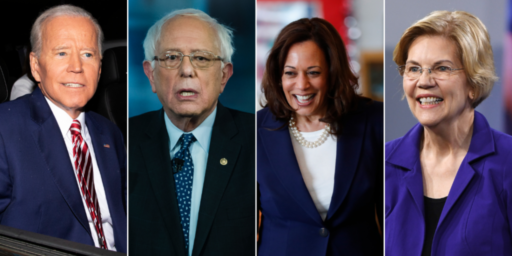
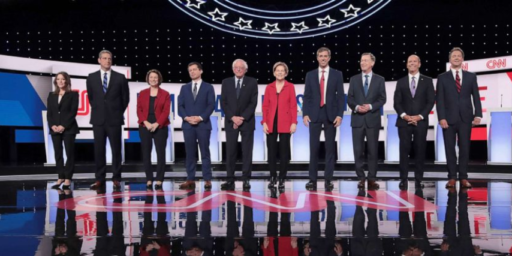
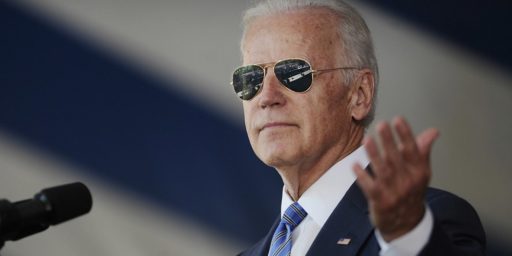
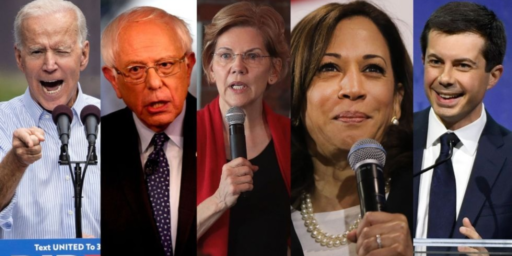
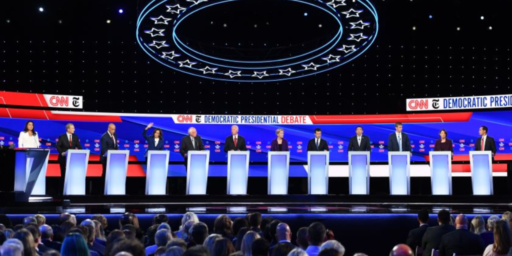
Go away Bernie. Just go away.
Same with BernieBros. Go away.
@EddieInCA: Some dumb conservative push-poll on social media asked
“Who has the most annoying supporters?
*Kamala Harris
*Elizabeth Warren”
and literally 90% of the comments were “Bernie” “Bernie Sanders” “Bernie” “Bernie”… 😛
@Teve:
I agree with some of Bernie’s policies. However, I’ve NEVER understood how a guy who is not even in the party can run for the nomination of said party. It has never made sense to me.
As for the Bernie Bros, the less said about them the better.
Gerald Ford, Al Gore, John Kerry and Hillary Clinton are shining examples of the near impossibility of overcoming a stereotype once it has become part of the mainstream press toolbox, rightly or wrongly. In reality, Ford was neither clumsy nor a “C student”. The stories that portrayed Gore as a serial exaggerator were mostly either true (he was the inspiration for the main character in “Love Story” according to the author who also happened to be his college roommate), or bizarrely twisted in order to rob him of credit he deserved (he never said he “invented the Internet”, but instead correctly took credit for having seen the possibilities of this obscure government network and chaired the committee responsible for making it available to the general public at no cost to us but still not requiring government subsidies). John Kerry actually was a war hero. And far from lying every time she opened her mouth, fact check after fact check showed that Clinton’s public statements through two election cycles were consistently more accurate than any of her opponents. But once those stereotypes took hold they were unstoppable.
Bernie is in danger of following in their footsteps, although in my opinion the stereotype would be true. But even if I am wrong there is a growing idea that Bernie is all about Bernie and doesn’t really care about getting things done. The reports are that his reaction to opponents adopting the ideas he claims to champion isn’t joy that they are finally getting traction but to fly off in fits of rage that others are stealing “his” ideas. It promotes the stereotype.
@EddieInCA: On twitter i have any mention of the word Bernie blocked. I highly recommend it. I also have every candidate account blocked on FB. I’m not going to suffer 75,000 political ads over the next 16 mos.
I also remind my peeps on facebook that any content of the type “Person who supports Democrat X says Democrat Y sucks donkey balls because ______” is so likely to be Russian/Republican fuckery that the best response is to Block first and ask questions never. Putin wants Trump elected because, unlike Trump supporters, Putin can see that Trump degrades America on every axis, and that benefits Putin. So critique and criticism and supporting one Dem over another are great but angry infighting is bad and don’t feed it.
We know his 2016 campaign received funding from the Russians and that senior campaign officials were communicating with senior campaign officials in the Trump campaign.
When his best case is “I was an UNWITTING Russian stooge who helped get Trump elected”, it’s not surprising he’s less popular with the Democrats now.
age when they became president, for dems in my lifetime:
Carter 52
Clinton 46
Obama 47
Are Dems more likely to win when they’re not elderly? Or is this just too small a sample size?
@EddieInCA:
Oh yeah I agree with many things Bernie says and he’s helped push the party to better values. But a) he’s not going to get it ever b) Ruskies constantly provoke Bernie vs. Hillary infighting, and c) some percentage of his supporters are aggro tards I don’t care to ever listen to. So I filter that shit out.
I suppose this should have been expected…that eventually real Democrats would come along espousing the same ideas as Sanders…why would Democrats need to pick someone who isn’t in their party when they can have the real thing with the same ideas they like…
@Teve:
It’s too small a sample size but the “new” Democrat elected just before that was John Kennedy at 43, the youngest man ever elected to the office. (Teddy Roosevelt became President at 42 but that was by elevation from VP upon the death of McKinley. Lyndon Johnson was elected after Kennedy and before Carter but, of course, was beaten by Kennedy and was then elected as a sitting President.)
Every time a Sanders surrogate puts forth the idea that other candidates are just piggybacking on his hard work, it only reminds me – again – that then-Professor Warren was able to develop the idea of, and successfully push through Congress, the Consumer Financial Protection Bureau *before she was actually a member of Congress.*
@Teve:
FYI, Wikipedia has a table of presidents including the age at which they were elected. You can sort the list by age, but not by party.
@Kathy: looks like the median is around 55 there, which sounds about right. the chart shows that it’s very unlikely to be elected after you’re 70, but it wouldn’t surprise me if we have two 70+ers in a row, given how hard a time baby boomers are having getting the fuck off the stage. 😀
Hmmmm, correct me if I’m wrong but didn’t Sanders lose in 2016?
@Teve: It may be too small of a sample size, but considering that for most of my adulthood (I’ll be 67 in a week) living past 70 or 75 was relatively unusual, a larger sample size will not yield different results. IIRC, when Reagan was elected, he was the oldest President ever at just under 70 y-o. Link By far and away, the typical age of presidents historically has been 50-60.
@EddieInCA:
This. If he wants the Democratic nomination, he has to formally join the party first.
That he defiantly won’t says everything about how he would lead.
The chances of some unexpected, dramatic event throwing the primary into turmoil are higher than usual, given the two leading candidates are closer to 80 than 70. Indeed even Elizabeth Warren is at an age when many people start to experience health conditions which mean they can no longer cope with an exceptionally demanding full-time job. But assuming everyone gets to Iowa in one piece, and nobody has taken a commanding lead by then, Bernie’s chances will depend on what proportion of other candidates’ supporters he can pull to his side as they drop out. It’s not to the point that ‘Sanders is the second choice of a plurality of Biden voters’ if he’s trying to beat Biden in a two horse race.
Would a majority of Booker’s supporters go to Sanders if their man dropped out? Doubtful. Buttigieg’s? Ditto. Would Warren’s supporters see Sanders as their second choice? Possibly. But if the early casualties’ supporters flow strongly to Harris, she could even be the frontrunner by then and have momentum that would be difficult to stop.
In short it’s much too early to make any sensible forecasts, the polls are virtually worthless as predictors of the final winner, and things are likely to remain fluid until well into the new year. Which I believe is all good: it keeps attention on the Democratic Party’s agenda instead of the antics of the maniac in the White House, and it means the Republican Party can’t set up a single target for two years of relentless dirty tricks the way they did with Hillary.